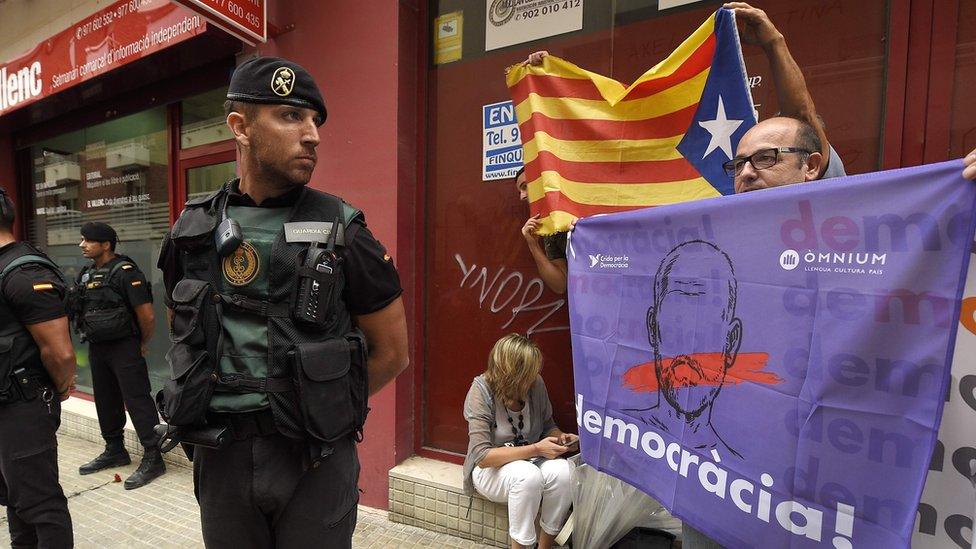Catalonia referendum: Tractors roll into Barcelona to support vote
- Published
Tractors have gathered in Barcelona to show support for the referendum
Columns of tractors waving the lone-star flag of Catalan independence are converging on the region's towns in support of Sunday's banned referendum.
Supporters cheered as a column of vehicles, dubbed a Tractorada, rolled into the capital, Barcelona, streaming past the famous Sagrada Familia church.
Catalan leaders have finally revealed the ballot boxes they plan to use.
The Spanish government has again pledged to stop the referendum, which it says is unconstitutional.
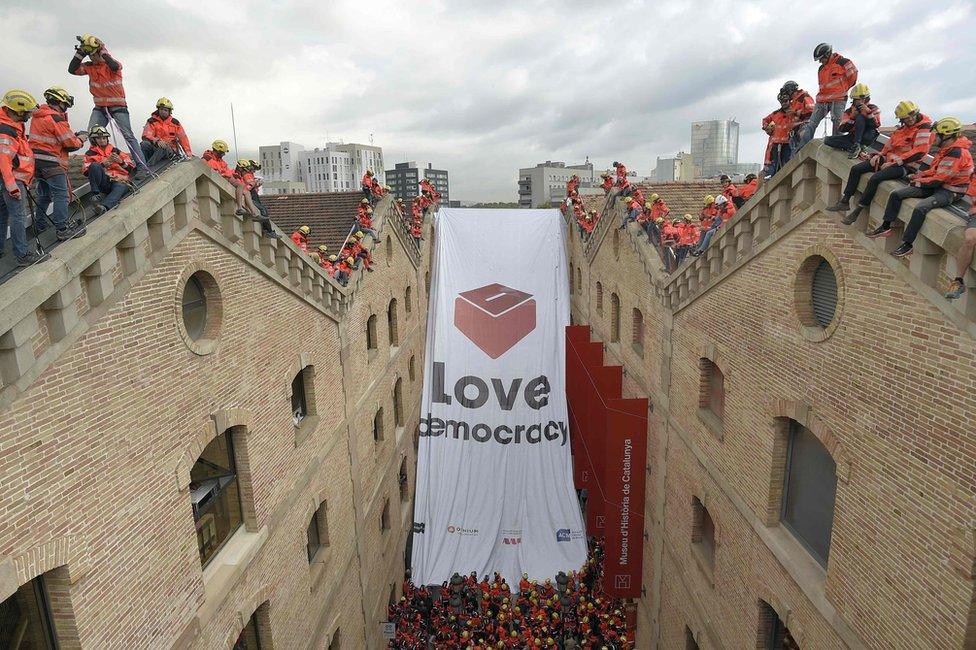
Firefighters showed off a pro-referendum banner in Barcelona on Thursday
It is crunch time in Catalonia, where for the past five years the region's devolved government has demanded a referendum on independence from Spain, the BBC's Tom Burridge reports from Barcelona.
Under a law passed by the local parliament, Catalan leaders say they may declare independence from Spain within 48 hours of the vote.
"After the official proclamation of the results, which should take a few days. there is a period of 48 hours to proclaim independence but this does not exclude the possibility of us making yet another appeal on the night of the 1st [Sunday] for the need to sit down and talk to resolve this politically," Catalan President Carles Puigdemont told BBC News on Friday.
The wealthy region of 7.5 million people in north-eastern Spain has its own language and culture, and a high degree of autonomy, but it is not recognised as a separate nation by the Spanish state.
What are the tractors for?
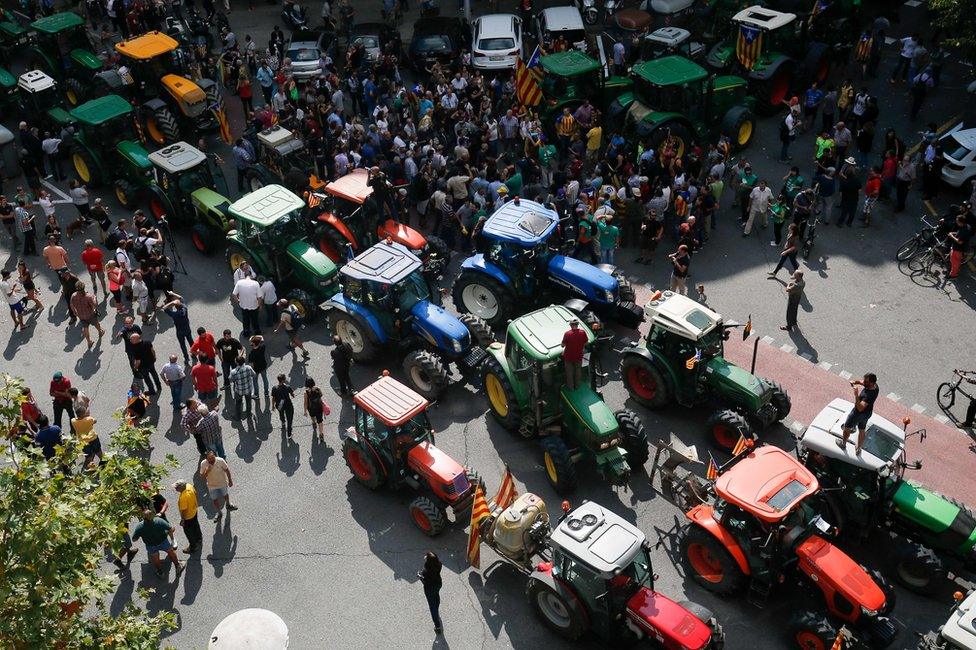
Hundreds of Catalan farmers are involved
Tractoradas could also be seen in Catalan towns like Girona and Tarragona on Friday.
"We are asking for tractors to be parked peacefully near polling stations and, if they try to close them, impede them or make it as difficult as possible," a member of one farmers' group, Gerard Batalla, told AFP news agency earlier this week.
"Simply leave them there, without going further."
What other preparations are being made?
A plastic ballot box was shown off to journalists on Friday at a news conference by Catalan Vice-President Oriol Junqueras and Raul Romeva, who handles foreign relations for the Catalan government.
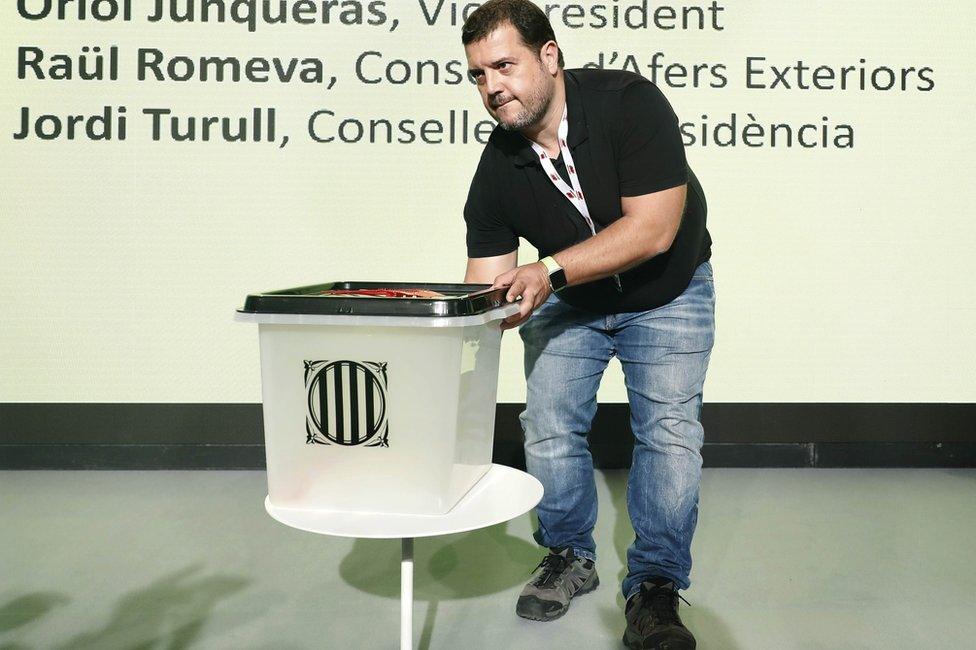
The box they couldn't seize?
Police have been under orders to confiscate all referendum materials and to prevent public buildings being used as polling stations, while key figures in the referendum campaign have been threatened with prosecution.
However, teachers and students at some schools are organising to keep them open for the vote, using coded messages on social media to make arrangements.
Teachers chanted and shook keys in support of the Catalonia vote
Hundreds of teachers gathered at the regional government's headquarters on Thursday, chanting "we will open" and "we will vote".
A website - escolesobertes.eu ("open schools") - has been set up so people can track which schools are open.
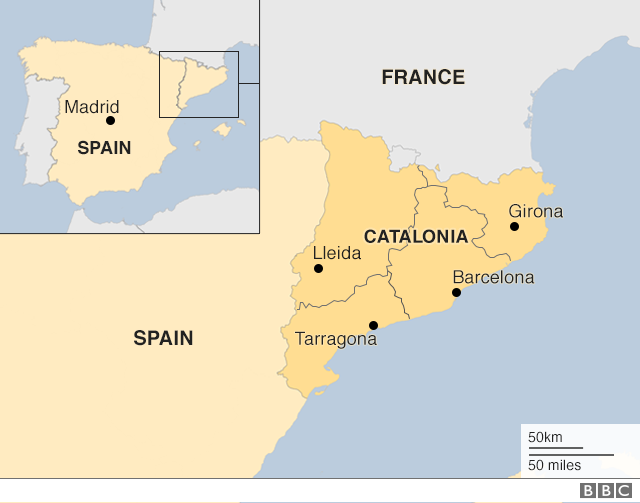
Meanwhile, a smartphone app launched to spread information has been targeted by the courts.
Catalonia's high court told Google to delete the "On Votar 1-Oct" app from its application store. It said the app violated court orders to suspend the referendum.
Mr Puigdemont had recommended that people download the app, external to learn where to vote on Sunday.
It has received more than 1,100 five-star reviews, many of which directly appeal to Google to ignore the court. The referendum's official website domains have also repeatedly been seized.
Why is Madrid so opposed to the vote?
Spain is likely to deploy thousands of national police officers, currently stationed on board two cruise ships docked in Barcelona's port, to disrupt any voting, and ultimately to guarantee Spanish sovereignty over Catalonia, our correspondent says.
Restrictions have been introduced on commercial light aircraft and helicopters flying over Barcelona this weekend to prevent activists trailing banners, according to local media.
Students have declared a pro-independence "strike"
Spanish government spokesman Iñigo Mendez de Vigo blamed the Catalan government for the stand-off in a BBC interview, suggesting it had been both inflexible and one-sided.
"We can change the constitution if there is a consensus in order to change it," he said.
"There isn't a consensus in order to change the Spanish constitution, so this is why the Catalan government acts unilaterally. It takes two to tango and in this case the Spanish government was always ready to talk but they didn't want to dance."
He also told a news conference: "There will not be any referendum in Catalonia."
Catalan leaders have appealed for help from the European Union, saying Madrid has undermined the bloc's democratic values. On Friday, European Parliament President Antonio Tajani said the referendum was illegal but that he would work towards a political solution between the Madrid government and the devolved administration.
Why some Catalans want independence
- Published20 September 2017
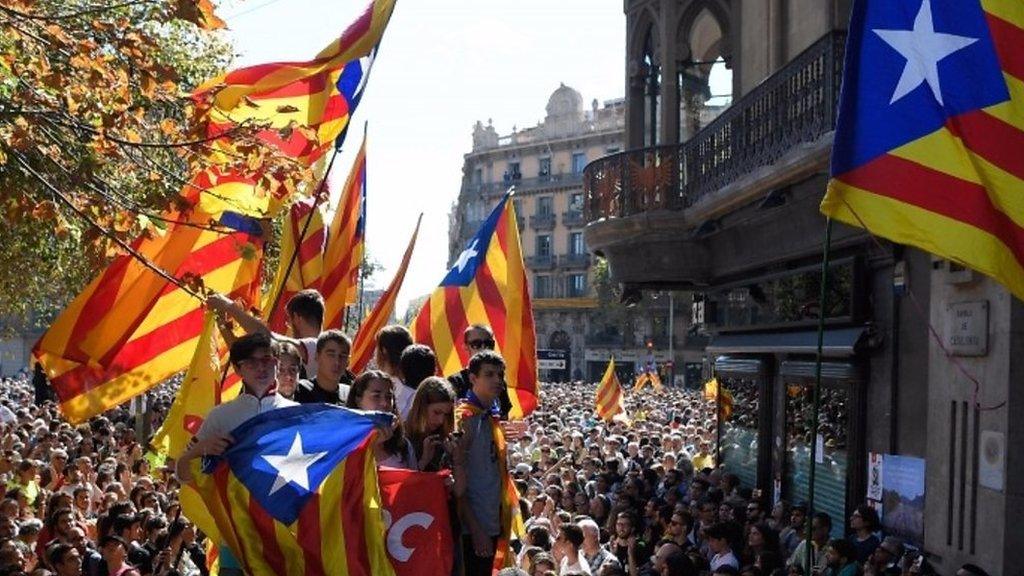
- Published18 October 2019
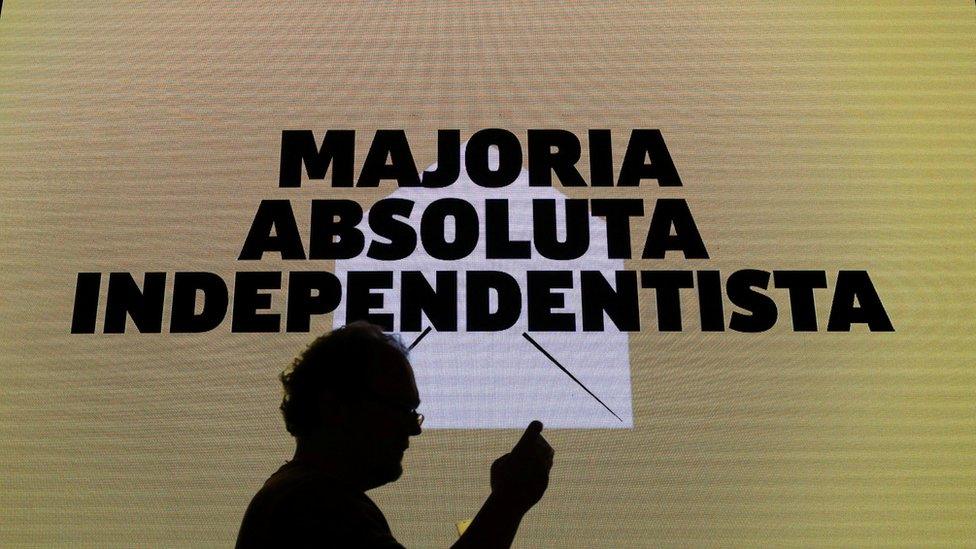
- Published21 September 2017
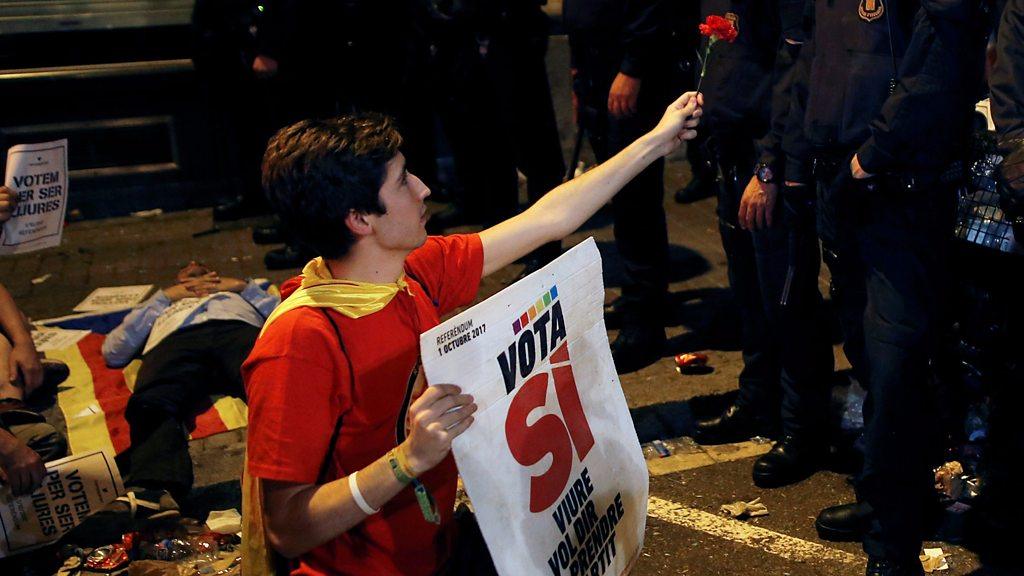
- Published21 September 2017
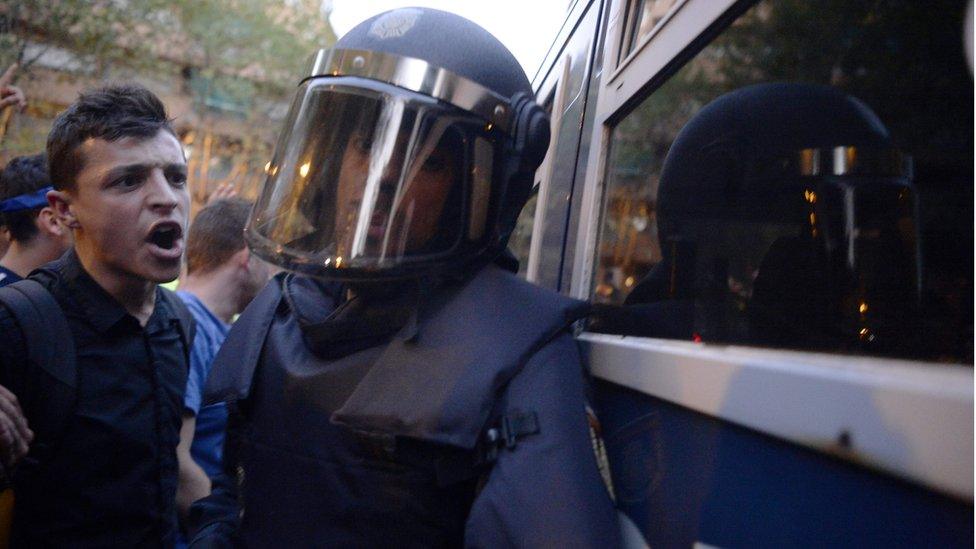
- Published15 September 2017
